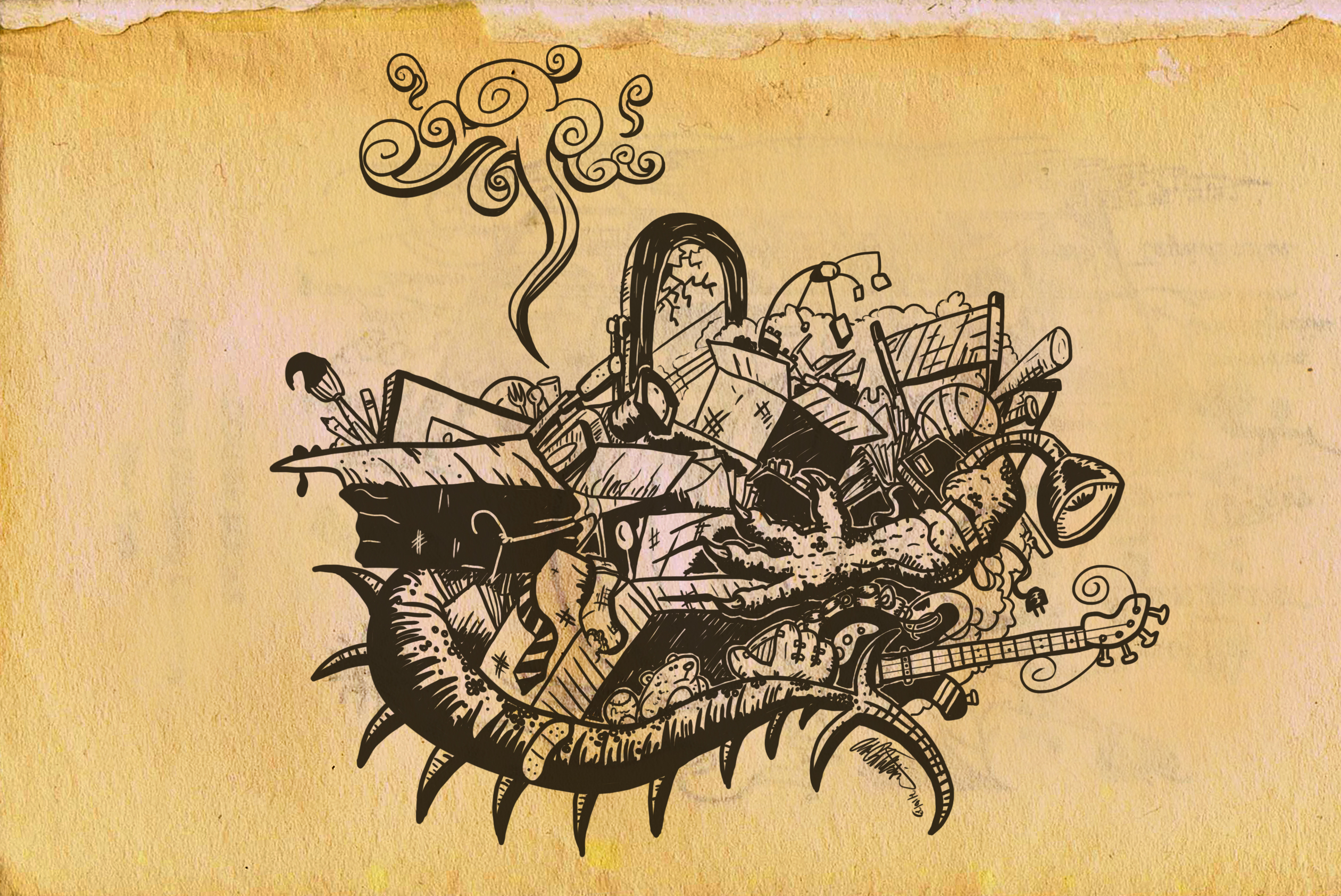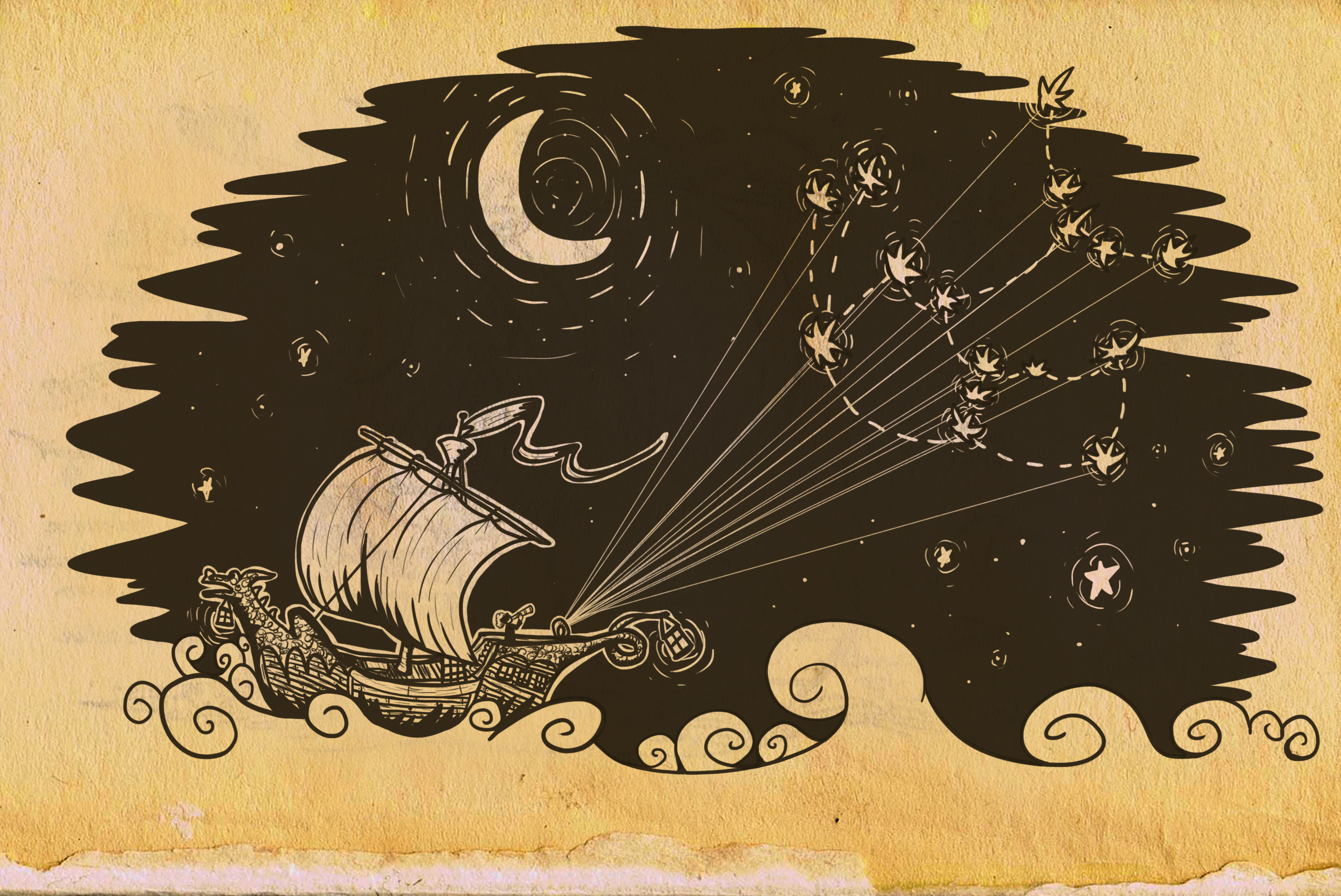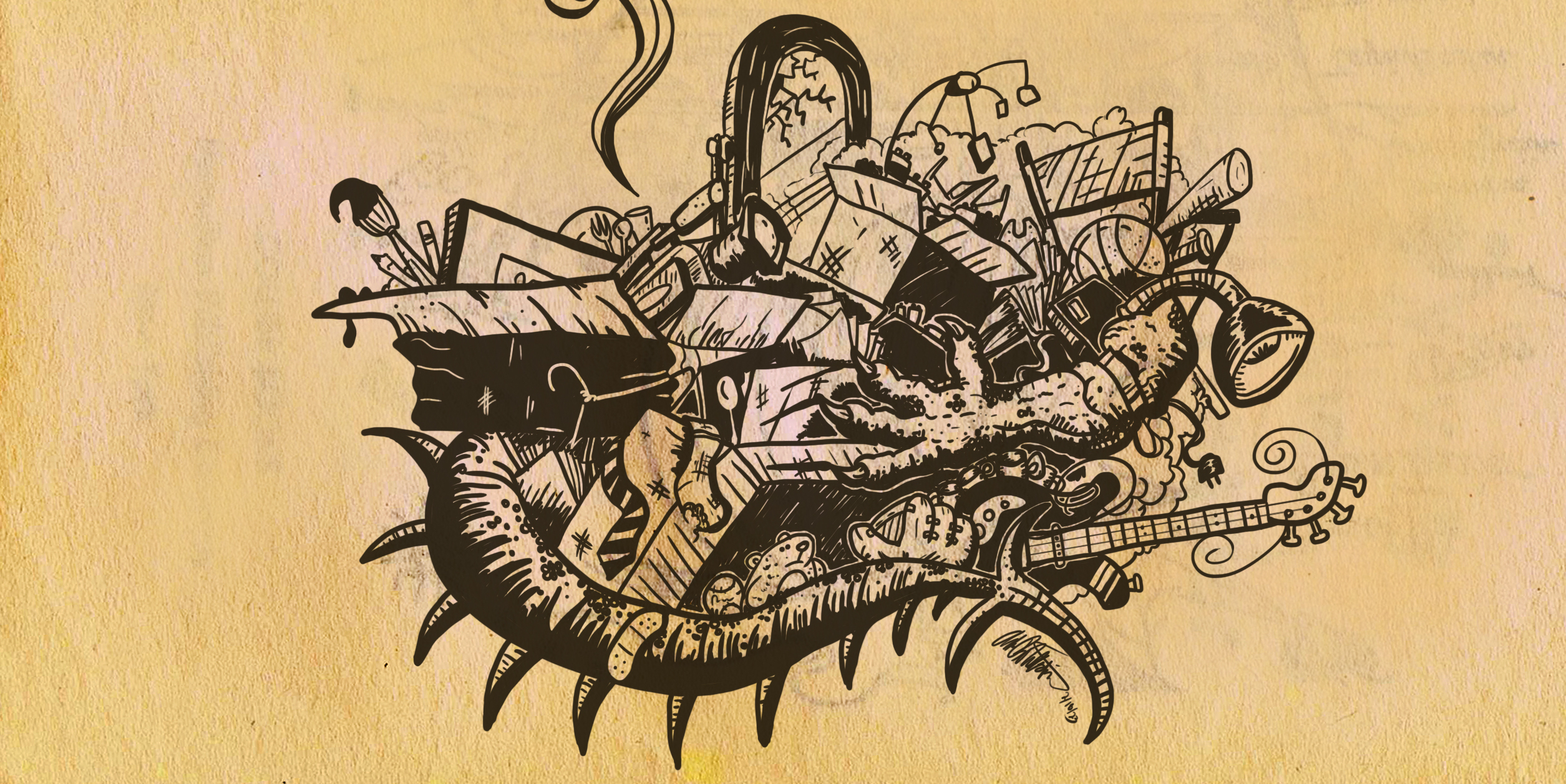There was a boy called Eustace Clarence Scrubb, and he almost deserved it.”[1] This amusing sentence is the opening line to C.S. Lewis’ The Voyage of the Dawn Treader, the third book in The Chronicles of Narnia series. I read these stories to my kids during the pandemic from my Wife’s much loved (and much falling apart) paperback copies she held onto from when she was a kid. Like the toy wooden construction vehicles my great uncle carved for my brother and me, blankets crocheted with love by grandmothers, and our beloved storybooks, there is great pleasure in handing down something treasured from your childhood to your own children. However, not everything I’ve held onto is beneficial to one day pass on.
In my marriage (my Wife will attest to this), I am the pack-rat. I keep stuff. Be it my notes from college that prove to me that I earned my degree, goofy knickknacks acquired from my teenage years that remind me of simpler times, or family heirlooms (or stuff just given to me because older relatives didn’t want them anymore) that give me the feeling my far-off loved ones are still close by.
I also keep stuff that is just… stuff. ‘Cuz it’s just hard for me to let go. Letting something go feels like losing a piece of myself, of my history, of my identity.
My Wife has been sweetly (and occasionally, by her own admission, not so sweetly) inviting me to consider letting go of my ‘clutter’ for years now – usually after having to move several things out of the way from our ‘past life’ to locate something else that benefits our current reality. So after a few half-hearted attempts, in the wake of a large and difficult shift in our lives, it finally felt like it was time for me to begin in earnest. I started engaging with the videos she would watch from YouTube channels with catchy branding like “A Slob Comes Clean” [2], “Clutterbug” [3], and “The Minimal Mom” [4]. I found myself awakening to what was around me, and in that awareness a momentum started building with the little stuff, the easier stuff… the stuff that wasn’t sentimental or important. And certainly, none of the things that had identity strings attached to them–especially the things that reminded me of who I felt I once was, or who others (or more likely myself) expected me to be by now.
Then one day, one of the affable YouTube decluttering influencers gave an analogy that struck me hard. They invited their audience to imagine a baby’s bedroom–cute and cozy and filled with what is needed for the flourishing life of an infant. However, infants grow and their needs change, and as those needs change, some things that were once wonderful and helpful will lose their purpose. Think diaper changing stations, cribs and rocking chairs. If out of sentimentality, or some other reason, we continue to keep these items in their room, the quickly growing kid (and you) are going to have a hard time moving around in there. More and more, as they mature into their teens, there will be new things brought in to serve their new needs (and tastes), but their old things will keep piling up, or they’ll have to figure out how to work with things that no longer serve them well. (Imagine a lanky teenage boy’s legs hanging over the railing of a crib as they struggle to sleep.) Free space in that room will become non-existent, and the current stage of life will become near impossible to live in because of our inability to let go of what is no longer beneficial. It also invites us to ask whether we’re truly honoring the past by tossing it into piles, tripping over it, and holding so tightly onto it when it no longer benefits us, especially when it could possibly be given to someone else in a stage of life where it might actually do some good. Like with diapers, once something has fulfilled its intended purpose, keeping it around can cause… issues.
It hurts to unpack and declutter sentimental physical possessions, but it all the more hurts to unpack and declutter meaning-filled matters of the mind, heart, and soul. We struggle with even the notion of unpacking well-entrenched thought patterns or unhelpful impulses, assessing characteristics based on unhealthy relationships, crushing community expectations, or even long held but faltering political allegiances and incomplete theologies… things that once felt so essential to our identities but are now (for whatever reason) not helpful or even perhaps harmful. This stripping off of things that have become corrosive or destructive within our interior life can feel even more impossible than the exterior work because each removal can leave a greater void that can make us feel adrift without a sense of who we are anymore.
The fragile nature of this work, especially in the face of the enormity of it, can inspire an impulse to throw it all out–-even the needed, beautiful, dependable things that are faithful and true. ‘Descaling our dragon scales’ and accurately assessing what has made up our identities is hard, messy, soul-wrenching work. In fact, we are likely incapable to complete this work on our own without divine intervention.

Eustace Scrubb, that disagreeable boy mentioned earlier, experiences this for himself. In his reluctant participation in the adventures of his Pevensie cousins, he privately happens to stumble upon some enchanted dragon treasure. But after picking up a bracelet and placing it on his arm, he becomes a dragon himself. Try as he might, Eustace is unable to change his condition. So along comes the great lion, Aslan, who must do it for him. It isn’t easy or without great pain. Aslan’s claws cut into the boy-dragon’s scales over and over again. Eustace describes the pain in a way that may resonate.
“The very first tear he made was so deep that I thought it had gone right into my heart. And when he began pulling the skin off, it hurt worse than anything I’ve ever felt. The only thing that made me able to bear it was just the pleasure of feeling the stuff peel off. You know—if you’ve ever picked the scab of a sore place. It hurts like billy-oh but it is such fun to see it coming away.” [5]
When we let go of what we allowed to ‘define’ who we thought we were, as painful as that is, we can then fully receive the call of who we truly are.
In Judges chapter 6, before Gideon can lead God’s people to victory, he’s got to tear down his dad’s altar to Baal and the Asherah pole next to it. He’s got to declutter his own backyard first. Gideon (eventually) agrees to God’s call, but when we are stubbornly unwilling to let go, sometimes it is the grace of God to tear things from us. In Genesis 11, rather than spreading out across the earth, accepting God’s blessing and call to bring flourishing to all creation, people instead decide to clump and build a tower to construct their own sense of identity. God’s partnership with humans wasn’t for them to clump, to horde, to build walls that keep their blessing in and keep others who are not ‘us’ out. So, in order to restore their true identities as agents of flourishing, God confuses their language so they CAN’T clump, but MUST spread out to resume their true call. They can do nothing now but go back out into the far reaches of the earth, leaving their towering monument to a false identity behind. I feel I can somewhat understand how hard that must have been for them to feel so confused at why those they shared common purpose and community with, people they built their identity on, could now no longer ‘speak the same language’.
In the troubling times we’ve gone through in these past few years, in the upending and tearing apart of communities, in the challenges that any relationship can have in these difficult days, when so much feels so important and different opinions feel so dangerous, when loyalty and love have been divided and broken again and again, when truth itself can seem so clear and yet so cloudy at the same time, it is worth examining how much we’ve cluttered our identities with things that have distracted us from God’s call for our lives. Have we sought to ‘make a name for ourselves’ by the walls that we’ve built or the ‘stuff’ we hoard or the ideas we grasp? Is it possible that in some way God has, in His good love for us, ‘confused our languages’ at times for our own good? Has what we were building (even what we thought we were building in His name) needed to be stopped because it either served its intended purpose already or we’ve turned it into something it was never meant to be? Have we cluttered our hearts with tribalism and exclusionary identities that rob the dignity of others not like ‘us’? So, has God had to shake ‘us’ up and scatter ‘us’ for our own good and for the ultimate good of humanity? What dragon scales is He scraping off our world and our hearts right now?
Each box I open in my decluttering process requires me to ask myself some tough questions. Is this item beneficial to my current life, is it a blessing worth keeping safe and passing on, or is it a dragon scale – something I’m keeping that needs to be scraped away?
Am I hoarding it to feel important or to feel approved of or for some other reason that supports an identity not based on God’s call for my life? Is keeping this keeping me from living the life I’ve been given now to the full? For things that have already served their purposes, is it a disrespect of their blessing to hold onto it when it could be released freely to bless another in a similar way as it has blessed me? Do I keep treasure that turns me into a dragon? Am I building a tower to ‘make a name for myself’? What Asherah poles in my backyard need to come down so I can move forward in the calling God has for me next? What scales that God has already scraped away have I picked back up again? And what am I not able to receive from Him because I just can’t let go?
Our family was gifted a gorgeous hardback classic set of the Narnia books from a dear friend. And yet, even though our old books are, in some cases, split into sections and single pages, all tattered and becoming harder and harder to read… it’s still a struggle to imagine releasing them. To let things go with open hands can feel vulnerable, like something meaningful (that gave us meaning) might be lost. To clutch and hold fast to everything can give us a false sense of security. But the open hands of a child can freely give and receive things that the closed claws of a dragon never will. Time and seasons and life and death… existence is populated with comings and goings, welcomes and partings… sometimes the impulse to hoard is an attempt to keep our bearings on an infinite uncontrollable sea. But if we could rope the familiar stars and drag them behind our boat in an attempt to never feel lost again, we would never know where we actually are. And so it is when we hold onto stuff to define who we are.

When our intrinsic value is not based on what we hold, but who holds us, our souls can weather the seasons of plenty and scarcity, joy and sorrow, beauty and ashes better because what ultimately lasts cannot be purchased from a store or stored under a bed or tangled up in the mind. What lasts is the love of a God who gave up everything He had for you. Philippians 2 tells us all that Christ laid down to come live as one of us and die for us so that we might live the life He planned from the beginning. He left the glories and treasures of Heaven for us.
…and something tells me God has a whole lot more nice stuff than I do.
Maybe in light of that, I can let go of a few more things so that I can receive more of what He’s always wanted to give me. When we one day live in the flow of the abundant life of a loving God, we’ll never need to hoard anything again.
It’s time to let our dragon scales fall.
![]()
[1] Lewis, C.S. The Voyage of the Dawn Treader
[2] Dana K White (A Slob Comes Clean) – https://www.youtube.com/DanaKWhite
[3] Clutterbug – https://www.youtube.com/Clutterbug
[4] The Minimal Mom – https://www.youtube.com/TheMinimalMom
[5] Lewis, C.S. The Voyage of the Dawn Treader
Both pieces of artwork contained in this essay are original digital illustrations by the author Adam R. Nettesheim, and are used with his kind permission for Cultivating.
Adam Nettesheim is Director of Fellowship for The Cultivating Project, and a columnist for Cultivating magazine. Through writing and illustrating, Adam seeks to pull on the golden thread that leads us Homeward. Adam is a ‘Multi-Media Specialist’ by day at a municipality in Colorado but his most important (and favorite) work is husband to his wife Sarah and father to his 3 children. His writing (and a few other things) can be found at https://adamrnettesheim.com/.
Leave a Reply
A Field Guide to Cultivating ~ Essentials to Cultivating a Whole Life, Rooted in Christ, and Flourishing in Fellowship
Enjoy our gift to you as our Welcome to Cultivating! Discover the purpose of The Cultivating Project, and how you might find a "What, you too?" experience here with this fellowship of makers!


We’re currently finding ourselves needing to do exactly this…let some things go to make space for what benefits us now. The questions you ask here are really helpful for putting actual physical things in a healthier perspective. Thanks for that 😊
Hey Emily!
Thanks for saying so.
The three YouTube channels I reference in this piece are very helpful to me in my process. I recommend them to you as well!
God bless your decluttering!
I read Decluttering my Dragon Scales again this morning, Adam, and am struck so much with how it speaks right to the bone of it all. The roping the stars just nails me. This voices so much of what I am wrestling with myself during this stage of hard transition, not just with our house but also with my soul and identity. And your illustrations are so marvelous I wish we could make prints of them! Thank you for all of this and thank you for being you!
Thank you so much for putting this thoughts into words and onto paper. Adam, would you ever be willing to speak at a woman’s retreat about this topic? Every year I host a day retreat at our farm south of Castle Rock. This year I have struggled with a topic and a speaker and had nearly lost hope….until I read this essay. Would you consider such an endeavor? Lmk, and if consideration is even in your vocabulary regarding such a thing, then let’s talk. Most sincerely, Cecilia
Thank you Lancia. I know you know the challenges written here well. Thank you for the encouragement you’ve given me in my process!
Cecilia what a beautiful response! I’m very touched. I’ve reached out via email and am looking forward to learning more!
Thank you.